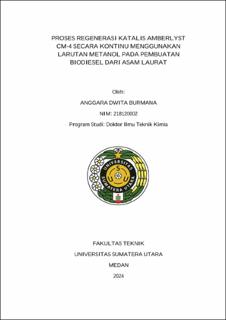Proses Regenerasi Katalis Amberlyst CM-4 Secara Kontinu Menggunakan Larutan Metanol pada Pembuatan Biodiesel dari Asam Laurat
Continuous Regeneration of the Amberlyst CM-4 Catalyst Using a Methanol Solution in the Production of Biodiesel from Lauric Acid

Date
2024Author
Burmana, Anggara Dwita
Advisor(s)
Tambun, Rondang
Haryanto, Bode
Sarah, Maya
Metadata
Show full item recordAbstract
Biodiesel is one of the fuels that can substitute fuel oil (diesel). Biodiesel is a fuel
produced from vegetable and animal oils. One of the natural resources that are
widely used as raw materials for making biodiesel is palm oil. Heterogeneous
catalysts in the production of biodiesel have become a concern for researchers
because of their potential to save chemical consumption and time. This study uses
lauric acid and methanol as raw materials and Amberlyst CM-4 as catalyst which
aims to analyze the total recycling of the catalyst and analyze the effect of
temperature, molar ratio and ester composition. Determination of the success of
making biodiesel in this study is if the conversion obtained is ≥ 80%. This refers to
the catalyst manufacturer used in the industrial world to reduce production costs in
making biodiesel. In this research, N2 gas serves as a stirrer and methanol as a
catalyst washing solution. In this study, temperature variations were carried out,
namely 60 oC; 70 oC; 80 oC and 90 oC, molar ratio variations, namely 5:1; 6:1; 7:1
and 8:1, with fixed variables, namely reaction time of 150 minutes and N2 gas
pressure of 2 bar. The best catalyst regeneration results obtained in the batch
process were obtained at a molar ratio of 8:1 and a reaction temperature of 60 oC
for 8 (eight) times while in the continuous process obtained at a molar ratio of 8:1
and a reaction temperature of 80 oC which is 24 (twenty-four) times.
